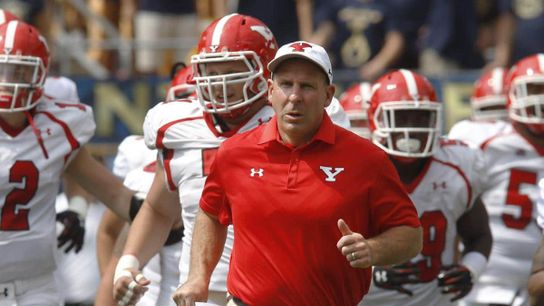Back by overwhelming demand, FootballScoop will once again examine the assistant coaching hires that will have the biggest impact on the college football season and the coaching job market in the 2020 season and beyond.
No. 20: Zach Arnett, Mississippi State
No. 19: Larry Fedora, Baylor
No. 18: Justin Hamilton, Virginia Tech
No. 17: Sean Gleeson, Rutgers
No. 16: Adam Fuller, Florida State
No. 15: Matt Lubick, Nebraska
No. 14: Mike Bobo, South Carolina
No. 13: Rhett Lashlee, Miami
No. 12: Marvin Lewis and Antonio Pierce, Arizona State
No. 11: David Ballou and Matt Rhea, Alabama
No. 10: Scott Cochran, Georgia
No. 9: DJ Durkin, Ole Miss
No. 8: Joe Moorhead, Oregon
No. 7: Todd Orlando, USC
No. 6: Chris Ash, Texas
No. 5: Chad Morris, Auburn
Who: Bo Pelini, LSU
Title: Defensive coordinator
Previous stop: Youngstown State head coach (2015-19)
Why he's important: Really? Him?
When Dave Aranda left for Baylor in January, Ed Orgeron could have had his choice of the top available defensive minds in college football. Any of them. The job sits directly on top of an absolute oil gusher in talent -- both on the roster and within LSU's recruiting footprint. The previous defensive coordinator was the highest-paid assistant coach in college football history, and left to become a first-time head coach at a Power 5 school. The LSU defensive coordinator job checks every box with a diamond-encrusted check mark. What up-and-coming defensive mind wouldn't want that kind of opportunity?
And Orgeron hired Bo Pelini.
Orgeron and Pelini have never worked together previously. (To be fair, O had never worked with Joe Brady, either.) Pelini has coached at LSU before, helping Les Miles to a national championship in 2007 before bouncing for Nebraska.
That happens to be the last time Pelini coordinated a defense, when George W. Bush was President and, outside of Gus Malzahn's Arkansas, most everyone in the SEC West was still huddling and sticking their quarterback under center.
LSU will switch from a 3-4 to a 4-3 which (outside of what he sees as an opportunity to increase the Tigers' pass rush from the interior defensive line) Pelini downplayed the significance of.
"You have to do what your players do best. It's not about the scheme, it's about giving them the best chance to have success," he said.
“(Pelini’s) defense had the ability to kind of morph from week to week to stop whatever we were most concerned about going into the game,” John Papuchis, Pelini's defensive coordinator at Nebraska and a GA under him at LSU, told The Athletic.
Orgeron also said LSU plans to play more 2-high safety looks, compared to Aranda's preference of Cover 1.
But biggest change will be in the personality of the men implementing those schemes. LSU moves from the quiet intensity of Aranda -- the perfect yin to Orgeron's yang -- to the, uh, intense intensity of Pelini.
"I think our players will get used to it," he said in an April interview. "I think they liked it so far, but they haven't seen anything yet."
Though six draftees are gone from a defense that tied for 29th in yards per play (5.11), LSU returns plenty of talent.
Pelini said he had multiple defensive lineman who had "Glenn Dorsey potential," and envisioned playing senior safety JaCoby Stevens in a jack-of-all-trades position similar to how LaRon Landry used to prowl sideline-to-sideline on Pelini's first defenses. Pelini recruited North Dakota State linebacker, an FCS All-American, Jabril Cox to Baton Rouge; Cox could have been selected in this year's draft, but chose to play another college football season instead. Sophomore cornerback Derek Stingley, Jr., enters 2020 as -- in my eyes, at least -- the best defensive player in college football.
The Tigers will enter 2020 firmly in the Top 10, though no one expects a repeat. Some amount of a rebuild is inevitable. But the 2019 season unlocked the potential of what LSU can be -- a perennial national power on par with Alabama and Clemson.
All the ingredients are there, as long as Coach O's bet on Pelini proves to be the right one.
